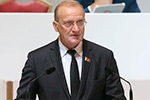

Today science must foresee new strategies and set out new areas for the development of industries, said Vladimir Gusakov. The country is actively developing the scientific framework for new industries that will shape the economy of the future.
Cross-cutting research-and-production associations are created on the basis of efficient R&D. The national scientific and technological park BelBiograd is one of such examples. All documents have been developed, passed an examination and reviewed. Biotechnology is the fastest growing industry in the world. Belarus has already created good infrastructure for this, said Vladimir Gusakov.
He added that scientists are working on a new Belarusian Earth remote sensing satellite, mounted the first module of the Belarusian Antarctic station. They are also developing a new lineup of modern multipurpose unmanned aerial systems, and testing 3D printing for different areas of science and practice.
The National Academy of Sciences of Belarus provides scientific support to the nuclear power plant, and scientists are doing everything so that it should meet the latest scientific parameters. The research institutes are working on the needs of the plant but we need a research reactor for proactive testing of all possible situations, added Vladimir Gusakov.
He noted that the NASB is growing into a big research-and-production corporation. Today, the Academy transfers innovative solutions to industries and is creating its own innovative manufactures. 10 such facilities were created in 2015, and it’s planned to open six more in 2016, informed Vladimir Gusakov.
Vladimir Gusakov added that the Academy of Sciences has expanded international relations, intensified work with foreign partners, and signed contacts with scientists from more than 80 countries.
According to BelTA